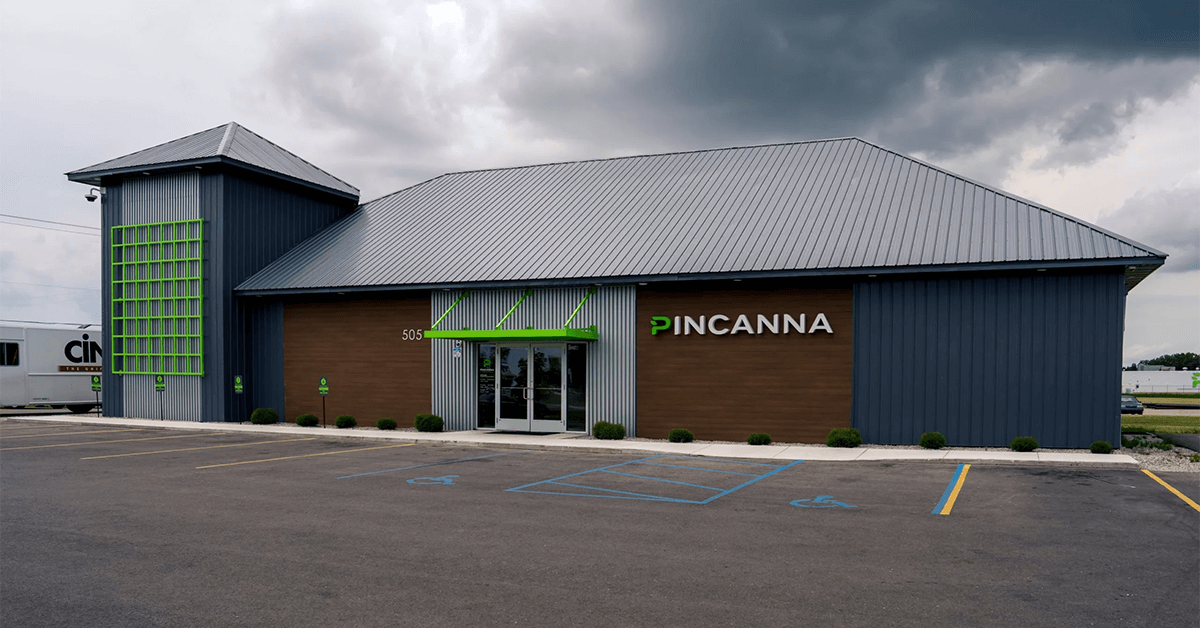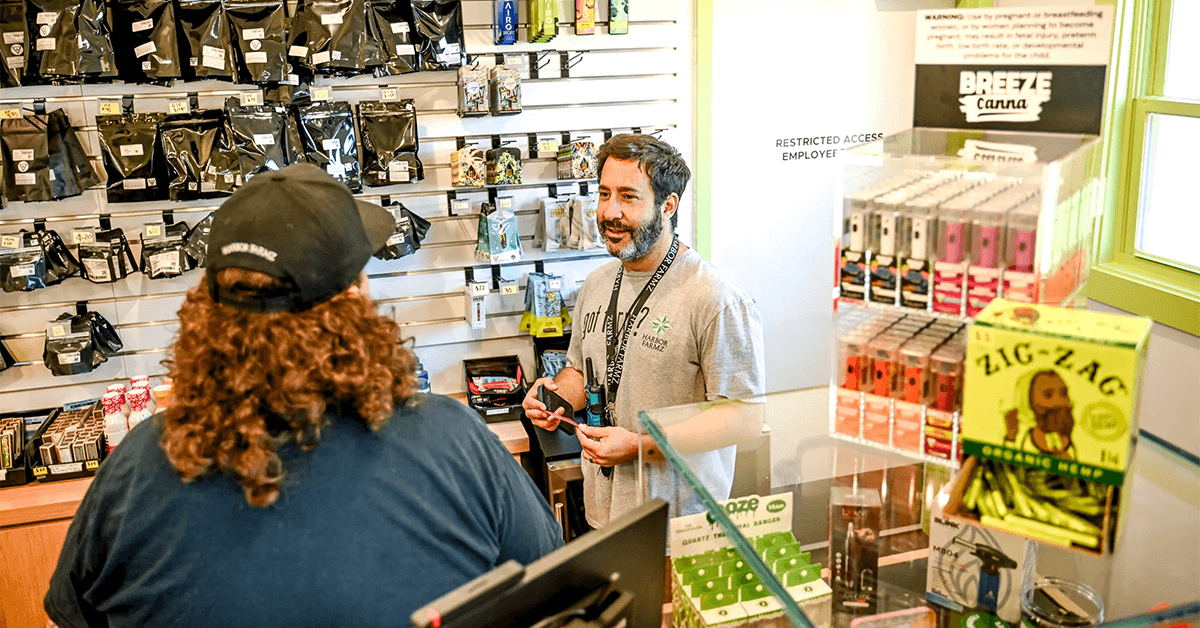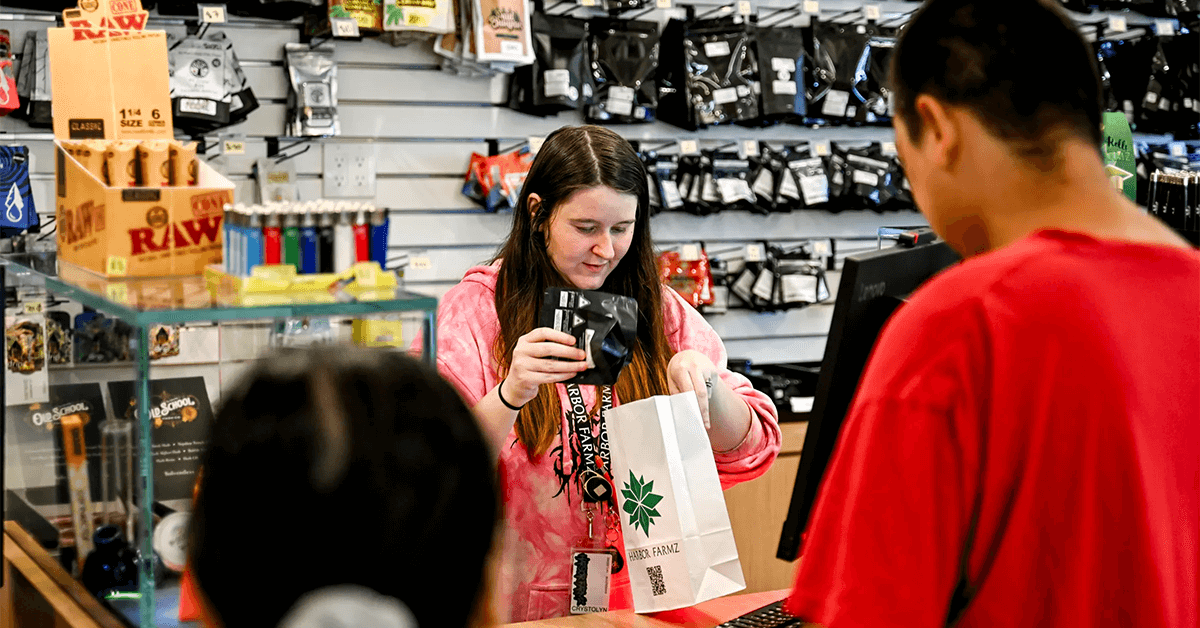Charlotte Welcomes Second Cannabis Dispensary, Hollywood Jacks

The cannabis industry is expanding in Charlotte, Michigan, as Hollywood Jacks prepares to become the second dispensary to open in Eaton County. This marks a significant development for a community that has long resisted the establishment of cannabis facilities.
Brian Miller, the owner of Hollywood Jacks, is eager to welcome customers to his new dispensary.
"It's absolutely a dream come true," Miller expressed, highlighting his enthusiasm for the business venture.
As Hollywood Jacks gets ready to open, local business owners and residents are sharing their perspectives on this new addition to the community. Isaac Howard, the manager of Domino's, noted an uptick in activity in recent weeks.
"It's been kind of busy lately, it's increased over the past couple weeks," Howard said. "It will probably help the rest of the town get more traffic going."
Eaton County has historically been cautious about allowing recreational cannabis stores, even as such establishments became more common in surrounding areas. City council members have conducted extensive research into the potential impact of these stores on public safety and community welfare.
Mitch Maltz, the store manager at Harbor Farmz, the first cannabis shop to open in Charlotte, shared his positive experience.
"Business has been really good, love the fact we have our own products here," Maltz said.
The arrival of both Harbor Farmz and Hollywood Jacks is expected to bring substantial economic benefits to Charlotte. In Michigan's 2023 fiscal year, each licensed retail store and microbusiness generated over $59,000 for their respective municipalities and counties. Eaton County, which did not receive any of this revenue in the past, is now poised to benefit from this additional income.
Brian Miller extended his gratitude to the community, expressing appreciation for the support he has received.
"I just would like to thank all the community," Miller said.
New State-of-the-Art Cannabis Facility in Detroit Funded by Rainbow Realty

Rainbow Realty Group IV, LLC, in collaboration with Rainbow Realty Group II, LLC, and MJ Real Estate Investment Trust, has finalized a senior mortgage secured by a newly constructed industrial building in Detroit, Michigan.
The 110,670-square-foot building, situated on 5.49 acres, is operating as a licensed cannabis cultivation facility serving both the recreational and medical markets in Michigan. The borrower acquired the land in 2018, obtained its cannabis license in 2022, and subsequently developed a state-of-the-art facility. Additionally, the borrower holds several retail dispensary licenses throughout Michigan, where its products are expected to be sold.
Ben Bolanos, Rainbow's Chief Operating Officer, expressed enthusiasm about the transaction, stating, "We are thrilled to finalize this mortgage transaction secured by a cutting-edge industrial facility. Equipped with advanced growing technology and equipment, the property positions the borrower to deliver high-quality cannabis products at competitive costs."
This announcement follows the recent news that Michigan's cannabis market has surpassed California's to become the largest in the United States by sales volume as of June 2024. This transaction marks Rainbow's third investment in Michigan, underscoring the firm's strong confidence in the state's robust cannabis market.
Best Cannabis Lawyers in Michigan for 2024

For those seeking expert legal assistance in the cannabis industry, Michigan Lawyers Weekly has announced its inaugural list of "Go To Lawyers" specializing in cannabis law. This recognition highlights top attorneys who have demonstrated exceptional knowledge and success in the complex and evolving field of cannabis legislation and regulation.
Why You Need a Cannabis Lawyer
Navigating the legal landscape of the cannabis industry in Michigan requires specialized knowledge. From understanding state-specific regulations to handling compliance issues and representing clients in court, a skilled cannabis lawyer is essential. Here's what makes a cannabis lawyer indispensable:
- Expertise in Cannabis Law: Knowledgeable about Michigan's cannabis laws, including licensing, compliance, and regulatory issues.
- Successful Track Record: Proven history of successfully handling cases and transactions in the cannabis sector.
- Peer Recommendations: Trusted by other legal professionals, often receiving referrals due to their expertise.
- Creative Legal Solutions: Capable of devising innovative solutions to complex legal challenges.
- Reliable Advice: The go-to person for reliable and thorough legal counsel in cannabis-related matters.
Meet Michigan's Leading Cannabis Lawyers
Michigan Lawyers Weekly's list of "Go To Lawyers" for cannabis law features the state's top legal experts. These attorneys have made significant contributions to the field and are recognized for their outstanding work:
- Kimberly A. Baber – Varnum, Grand Rapids
- Maxwell N. Barnes – Miller Johnson, Grand Rapids
- Lance Boldrey – Dykema Gossett, Lansing
- Emily E. Cantor – Warner Norcross + Judd, Grand Rapids
- Salam Elia – Elia Law, Birmingham
- Bernard J. Fuhs – Butzel, Detroit
- Sean Gallagher – Fraser Trebilcock Davis Dunlap & Cavanaugh, Lansing
- Michael Komorn – Komorn Law, Farmington Hills
- Bruce Leach – Law Office of Bruce Leach, Flint
- Alexander M. Leonowicz – Howard & Howard Attorneys, Royal Oak
- Douglas E. Mains – Honigman, Lansing
- Robert Nederhood – Foley & Lardner, Detroit
- David K. Puro – Cannatron, Oak Park
- Jeffrey M. Schroder – Plunkett Cooney, Bloomfield Hills
- David S. Senawi – Senawi Law, Birmingham
- Nicholas J. Tatro – Foley Baron Metzger & Juip, Livonia
- Kevin Washburn – McDonald Hopkins, Bloomfield Hills
Why These Lawyers Stand Out
These attorneys have been recognized for their deep understanding of Michigan's cannabis laws and their ability to navigate the intricacies of the legal system. Their profiles, to be published in the July 29th editions of Michigan Lawyers Weekly, will provide detailed insights into their careers and achievements.
How to Choose the Right Cannabis Lawyer
When selecting a cannabis lawyer, consider the following:
- Experience: Look for lawyers with a proven track record in cannabis law.
- Expertise: Ensure they have specific knowledge of Michigan's cannabis regulations.
- Reputation: Choose someone who is highly regarded by peers and clients.
- Approach: Find a lawyer who offers creative and comprehensive legal solutions.
Conclusion
For anyone involved in Michigan's cannabis industry, having a knowledgeable and experienced cannabis lawyer is crucial. The "Go To Lawyers" recognized by Michigan Lawyers Weekly represent the best in the field, offering invaluable expertise and support to navigate the complexities of cannabis law.
Pincanna's Pinconning Store Offers Wholesale Prices Direct from Cultivation Facility

Opened in February, the store in Pinconning offers cannabis flower, vapes, and edibles produced just 300 yards away at Pincanna's 135,000-square-foot cultivation facility. The products are sold at wholesale prices, with premium flower brand Head Stash Harvest retailing for $12 an eighth at the Pinconning location, compared to $20 at Pincanna's East Lansing store.
Founder and owner Robert Nusbaum explains the strategy behind the store's rural location.
"It's in the middle of nowhere, but it's a gateway to Up North," Nusbaum said. "We're doing this to benefit ourselves and our wholesale partners. When they stop in, they can stock up on our product for much cheaper and decide whether they like it. If they do, they can seek out our goods at one of our stores downstate or another store that sells our goods."
Nusbaum's background in retail, stemming from his family's success with New York Carpet World, has influenced Pincanna's approach. This customer-focused strategy has propelled Pincanna to become one of Michigan's largest cannabis cultivators. Despite Nusbaum's lack of experience in cannabis cultivation, he has assembled a team of experienced growers and processors, many of whom previously operated in the black market.
Among them is Ju Juan Coleman, known in the cannabis community as "Funk." Coleman has been making cannabis edibles for over 20 years, initially from his home kitchen in Detroit to treat his sickle cell anemia. Today, under the Funky Extracts brand, Coleman produces 400,000 infused edibles a month from Pincanna's state-of-the-art commercial kitchen.
Coleman's journey is mirrored by Vince Volovlek, who transitioned from opioids to cannabis following a severe ATV accident. Volovlek founded Michigan Organic Rub in 2013, creating balms containing THC to alleviate pain and inflammation. Nusbaum acquired Michigan Organic Rub in 2019 and promoted Volovlek to director of processing.
Nusbaum's philosophy is to harness the expertise of those passionate about cannabis while guiding them through the business aspects. He frequently visits the Pinconning facility to engage with staff and oversee operations.
"This is a relationship business we're building," Nusbaum said, emphasizing the importance of teamwork and collaboration.
Pincanna's innovative approach extends to its hiring practices, promoting talent from within based on potential and creativity. For example, a packaging department worker was promoted to head of packaging design after his doodles were noticed by Nusbaum.
However, balancing passion and profitability can be challenging. Nusbaum acknowledges the difficulties but remains optimistic about the company's direction. Recently, Don Newman, former director of cultivation at High Life Farms, joined Pincanna to enhance their growing operations. Newman has doubled production to 30,000 pounds without expanding the facility by optimizing growing techniques.
"We're producing twice as much as we were a year ago and that's all because of Don," Nusbaum said. "We have better production and our quality has gone through the roof. We've really started something special here."
Pincanna currently operates four retail stores in Pinconning, Kalkaska, East Lansing, and Kalamazoo, with plans to open two more in Mount Pleasant and Saline. Nusbaum aims to expand to 12 stores, allowing Pincanna to sell most of its flower in-house, thus boosting profit margins.
"We want to control our own destiny," Nusbaum said.
While Nusbaum envisions eventually selling the company, he remains dedicated to its growth for the foreseeable future. At 63, he foresees an exit in three to five years but continues to learn from his team of cannabis experts.
Pincanna's journey exemplifies how combining retail expertise with a passion for cannabis can drive success in the burgeoning industry.
Eaton County's First Recreational Cannabis Shop Sees Strong Start

Eaton County's first recreational cannabis store, Harbor Farmz Provisioning Center, has experienced a successful start, welcoming thousands of customers since its June 10th opening. Located at 122 Lansing Road, the store has drawn patrons from Charlotte, Olivet, and Bellevue, according to Assistant General Manager Alyssa Murray.
"We've had a very positive response from lots of people," Murray stated, highlighting the broad community interest.
While neighboring areas like Lansing and Ingham County had already embraced recreational cannabis sales and benefited from the accompanying tax revenue, Eaton County had not yet entered the market. This new venture brings anticipated financial benefits to local communities through state revenue.
During the 2023 fiscal year, Michigan collected $87 million in cannabis tax revenue, a significant increase from the $59.5 million collected in 2022. The revenue is distributed among 269 cities, villages, and townships allowing cannabis sales, with each eligible municipality and county receiving $59,000 per licensed retail store and microbusiness.
For example, Lansing, which has 21 cannabis dispensaries, received $1.4 million in tax revenue. Charlotte is also set to gain financially, charging a $5,000 application fee and a $5,000 annual renewal fee for each license. The city allows retail, safety facility, transport, and processing licenses, but excludes grow facility, microbusiness, consumption, or temporary licenses. All cannabis facilities in Charlotte are confined to three zoning areas: Lansing Road near Interstate 69, Clinton Trail near Meijer, and around Lipsey Drive and Packard Highway.
Harbor Farmz is the first of several expected cannabis businesses in Eaton County, with Hollywood Jacks and High Society Cannabis also in the process of setting up shop in Charlotte. According to City Clerk Mary LaRocque, these businesses are at various stages of the application process.

Charlotte's City Council approved the recreational cannabis ordinance on August 21st, 2023, by a 6-1 vote. The ordinance, which took effect in October, does not cap the number of dispensaries. Councilman Mike Duweck, who initially had reservations about recreational cannabis, supported the ordinance after recognizing potential benefits like property redevelopment, tax revenue, and job creation.
The Harbor Farmz site was previously a veterinary hospital, while Hollywood Jacks plans to repurpose a former Mexican restaurant. Duweck emphasized that the early entrants into the market are likely to succeed. Conversely, Councilman Anthony Rodriguez, the sole opposing vote, had concerns about crime statistics and dispensary locations but has since acknowledged the benefits and community support for the store.
Kathy McCoy, a Charlotte resident, expressed support for the new dispensaries, appreciating the repurposing of unused properties. "What's the harm?" she remarked.
Harbor Farmz, established in 2017, opened its first location in Three Rivers in 2022, where it was also the pioneering dispensary. For the Charlotte store, the company prioritized hiring local residents. Murray, a long-time Charlotte resident, emphasized the importance of a positive first impression. "It's an experience they're buying into," she said.
Customer Floyd Harkness, who uses cannabis for chronic pain, praised the knowledgeable service he received at Harbor Farmz. "They are knowledgeable. I was impressed with their knowledge the other day when I came, so that's what brought me back," he commented.
Verano's Cabbage Club Brings Premium Perks to Michigan Cannabis Consumers

Verano Holdings Corp., a prominent multi-state cannabis company, is expanding its innovative Cabbage Club membership program to Michigan, Connecticut, and Maryland. Cabbage Club, a pioneering cannabis membership club in the U.S., offers a variety of exclusive benefits to its members, including monthly store credits, merchandise, early access to product releases, line-skipping privileges, special event access, and concierge services.
Expansion and Benefits
The expansion to Michigan marks a significant development in Verano's efforts to provide unique, value-added experiences for cannabis consumers. Initially launched in Illinois and New Jersey, the Cabbage Club will now be available at Zen Leaf dispensaries, including one in Michigan. This expansion covers five states, with plans for further growth across Verano's 142 dispensaries in 13 states.
Cabbage Club members can enjoy numerous perks, such as:
- Monthly Store Credits and Seasonal Coupons: Members receive store credits and exclusive coupons each month.
- Exclusive Merchandise and Early Product Access: Access to members-only merchandise and early access to new product releases.
- VIP Event Access and Line-Skipping Privileges: Priority access to special events and the ability to skip lines at dispensaries.
- Private Concierge Services: Personalized services to enhance the shopping experience.
- Member Appreciation Days and Warm Cookies: Special appreciation events and complimentary cookies at checkout.
Membership Levels
Cabbage Club offers two main membership tiers:
- Dime Membership ($149): Includes $10 monthly store credit, $25 in seasonal coupons, and additional rewards, totaling $265 in annual value.
- Quarter Membership ($249): Includes $20 monthly store credit, $50 in seasonal coupons, and additional rewards, totaling $440 in annual value.
Additionally, there is the Silver Dollar Club, an exclusive tier available by invitation, which offers secret perks beyond those provided by the Dime and Quarter memberships.
Joining Cabbage Club
Starting July 1st, individuals can join Cabbage Club as Founding Members at a discounted rate by visiting earlyaccess.cabbageclub.co. This limited-time offer allows new members to enjoy the extensive benefits of the club at a reduced cost.
Verano's Chief Marketing Officer, David Spreckman, emphasized the success and future potential of Cabbage Club, stating, "After exceeding expectations in Illinois and New Jersey, introducing Cabbage Club to new consumers in leading cannabis markets underscores our mission to provide a unique shopping and community experience. We look forward to expanding the Cabbage Club community across our Zen Leaf and MÜV dispensaries."


 Helpful Links
Helpful Links